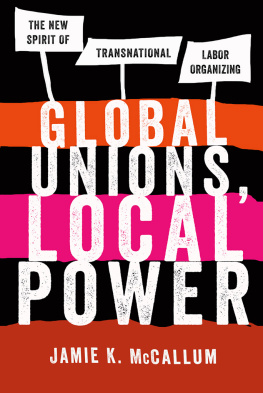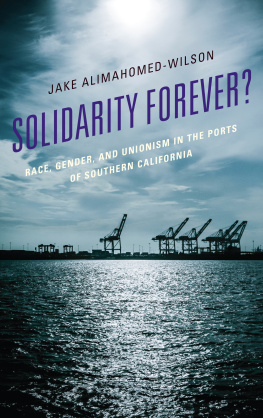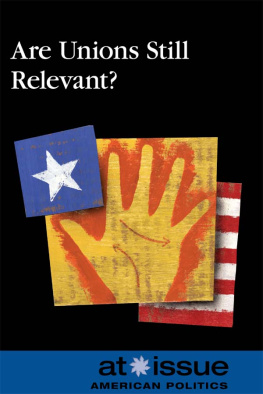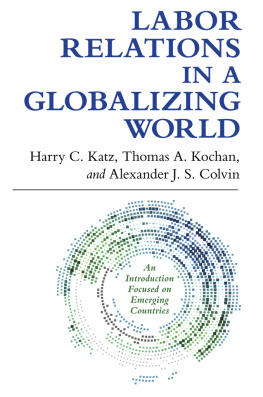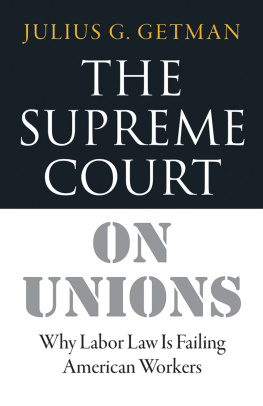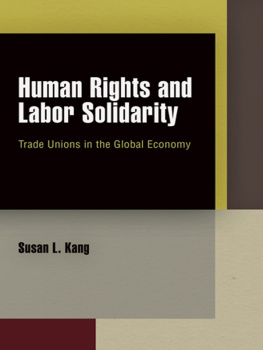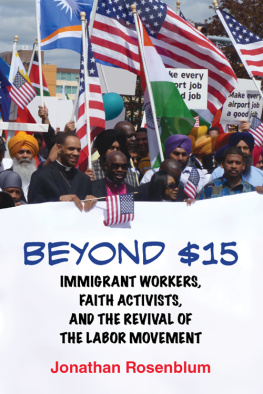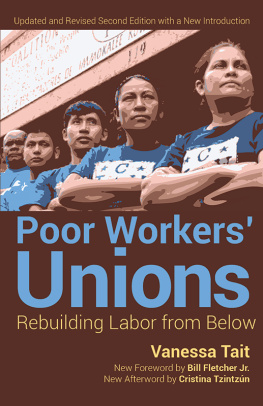ACKNOWLEDGMENTS
This book owes its life to the unionists and workers who shared their time and stories with me throughout the years I conducted research. You are the ardent couriers of an old idea made new again. In particular, I must recognize Mr. Cheeks, whose singular wisdom, courage, and compassion were so important.
It is not a book about why David sometimes wins or a recipe for labor union success. Nor was it written to give voice to low-wage workers struggling for a better life. Rather, I undertook the project to make sense of a particular historical conjuncture for labor. Along the wayand it was quite a journeyI accrued many personal debts.
At the City University of New York I owe endless appreciation to Frances Fox Piven, Ruth Milkman, John Torpey, and Stanley Aronowitz for their mentorship and insights over many years. I benefited from the support of a research grant from the Graduate Center and a fellowship at the Center for Place, Culture, and Politics, where I had the insightful criticism of David Harvey, Peter Hitchcock, Ruthie Gilmore, Manny Ness, and others. Blair Taylor was an astute editor and critic. Patrick Inglis helpfully challenged some of my assumptions, forcing a greater degree of clarity. All in all, the lumpen intelligentsia of New York City was an amazing resource, and I have drawn on many people within important institutions as this work has moved forwardmy comrades at Left Forum, Brecht Forum, and Bluestockings deserve special mention.
Peter Evans and Dimitris Stevis lent their considerable talent and expertise to reviewing this manuscript. I am grateful to have had such politically engaged and intellectually rigorous scholars improve my work. The book changed considerably as a result of their insights.
Outside the United States I am grateful for the guidance, feedback, and friendship over the years of Ian Greer in London. At the Freie Universitt, Mike Fichter roped me into a four-country study of global framework agreements, funded by the Hans-Bckler-Stiftung, that significantly influenced my views on governance. Eddie Webster offered me space to work and sage advice at the Sociology of Work Unit at the University of the Witswatersrand in Johannesburg, as did Supriya RoyChowdhury at the Institute for Social and Economic Change in Bangalore. In Geneva, my work was aided by Dan Gallin at the Global Labour Institute and Konstantinos Papadakis at the International Labor Organization. Lisa Berntsen in Rotterdam provided important translation assistance.
On the first day of my research abroad I acquired swine flu (H1N1), foisting me into the epicenter of a global pandemic. This presaged a series of research trips fraught with minor calamities that nearly ended my field-work numerous timesa bus crash near the Nepal border, a near-drowning in the Bay of Bengal, and a violent attack in Soweto. All of this contributed to the alienation and sensory overload that major cities in the developing world are famous for bestowing on new arrivals. For their care and patience during these times I owe heaps of gratitude to Lotta Staffans, Jason Hopps, Rebecca Harrison, Gretchen Wilson, Sowmya and Sriraj Reddy, Auntie and Uncle Ramalinga Reddy, Harish N., Anushree Sahay, and Sunil Kumar. In South Africa I would have been useless without the expert advice of Crispen Chinguno.
Over the years my research was aided by a network of global trade unionists and political activists who were sympathetic to my project and became important stakeholders in my success. Though most of them remain nameless in the book, their imprint is on every page. I am grateful for the help of several veteran organizers who took time to read versions of the manuscript, bluntly correcting me when I simply did not get it. In particular, I thank Audra Makuch, Muni Citrin, and Jane McAlevey for their careful insights into the world of labor. Jenna Latour-Nichols and Alan Sutton offered considerable help editing the manuscript as well as vital research assistance.
Some of this was written while I was actively engaged in labor union activity, on the margins of the proverbial trenches. The final stages took place while I contemplated various editing decisions from the comfort of an Adirondack chair overlooking the Green Mountains. I credit a handful of my students with reminding me that ones perspective and vantage point matters and to be mindful of that when considering pronouncements on the fate and future of movements. My colleagues in sociology and anthropology at Middlebury also shared their wisdom and varied expertise as I set about making revisions.
Fran Benson challenged me to write this book the first day we met, and her guidance throughout the process gave me the confidence to make the big decisions necessary to finish the job. I thank her and the wide array of talented folks at Cornell ILR Press.
Finally, my family, to whom this book is dedicated, deserves their own special roped-off area of gratitude. For making Vermont feel like home (where the heart is), I thank Erin. Her support made my life full of laughter and love when it was most needed. Her take on the worlda committed bottom-up perspectivealways challenged my well-worn ways of thinking. My brother, Fox, doubles as a best friend, and I am indebted to him for all that accrues from blood and comradeship. In addition, he deserves notable recognition for his good sense in bringing Jill, Oliver, and Eudora Lee into the family, all of whom have changed my life. My parents, my greatest mentors, inspired in me a curiosity for the world that made me who I am. Their unconditional support has never wavered, for which I will be ever grateful.

